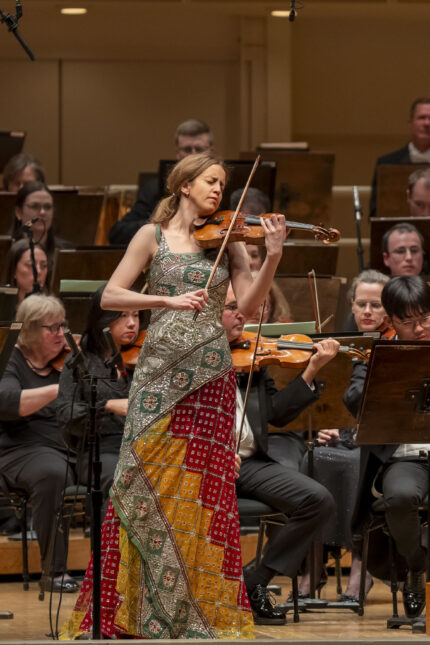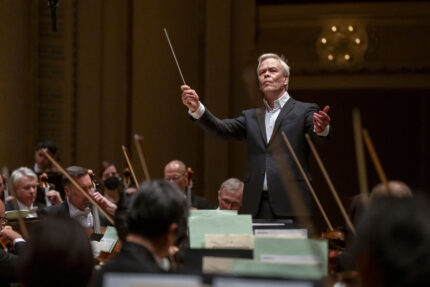Violinist Frang makes impressive CSO debut in Lintu’s eclectic program

Conductor Hannu Lintu is rightfully earning a reputation for creative programs and compelling performances in his local podium stands. From Sibelius’s Kullervo with the Grant Park Orchestra in 2011, to his CSO debut in 2020, and through his most recent downtown outing last February, the chief conductor of the Finnish National Opera and Ballet has consistently delivered thoughtful, spirited readings of both unexpected and familiar repertoire.
This trend continued as Lintu returned to Orchestra Hall Thursday night, leading lesser-known 20th-century works, including a standout soloist’s debut, alongside Tchaikovsky’s Swan Lake.
Thursday’s concert opened with John Adams’ Slominsky’s Earbox, a 15-minute piece inspired by the Russian musicologist Nicholas Slominsky, best known for his 1947 Lexicon of Musical Invective, which collects centuries of vitriol spewed by public and critics alike at works of new music. (Think of Eduard Hanslick who referred to Tchaikovsky’s Violin Concerto as music “whose stink you can hear.”)
There is an irony to a negative assessment of a score inspired by Slominsky’s “hyperenergetic activity,” but Adams’ 1995 opus felt tiresome. An initial outburst is sustained in manic modal flurries that unrelentingly whirl across the orchestra, a hat-tip to Slominsky’s collection The Thesaurus of Scales and Melodic Patterns. The texture belatedly thins to allow jazzy piano riffs to emerge, gamely dispatched by Northwestern’s Christopher Guzman, before resuming its insistent swirling to the end.
Earbox makes enormous technical demands on the orchestra with almost nonstop pyrotechnics. The CSO players’ facility shone throughout, particularly new principal viola Teng Li, even if ultimately Adams’ score felt like less than the sum of its many parts.
The second half opened with the first CSO performances of Fairytale Poem by Sofia Gubaidulina, her first orchestral work. Dating from 1971, the evocative ten-minute essay develops in an episodic, improvisatory fashion. Atmospheric wind trills give way to more emphatic, angular textures and a soaring violin melody, followed by skittering solos in the winds and strings over austere knocks in the piano. Throughout there is an ineffable sense of magic and whimsy, and Gubaidulina’s singular voice came through in Lintu’s intelligently paced reading.
Thursday’s soloist was the Norwegian violinist Vilde Frang, making her belated CSO debut in Stravinsky’s Violin Concerto in D. While Stravinsky studied the great D Major concertos of Beethoven, Tchaikovsky, and Brahms in preparation for writing his own work in the genre, the concerto’s musical language is entirely his own, its neoclassical vein evoking the 17th and 18th centuries far more than the 19th. The four-movement structure actually channels the Italian Baroque church sonata more than a standard concerto.
It is difficult to imagine a finer rendition of this work than Frang offered Thursday. Her rich tone moved fluently in and out of the orchestral textures in the motoric opening “Toccata.” She was acrobatic in the angular passages of the searching “Aria I” and probed the desolate melancholy of “Aria II,” with its echoes of Bach’s solo violin works.
Frang captured the playful, dancelike elements of the jauntily rhythmic “Capriccio,” building a primal energy in the coda that reminded one Stravinsky had also composed Rite of Spring. Lintu was fully in sync with his soloist, balancing the delicate interplay between her lines and Stravinsky’s kaleidoscopic accompaniment, though the latter was repeatedly marred by lapses from principal horn Mark Almond.

The Suite from Swan Lake ended the night, with Lintu bringing out the indelible sweep and drama of Tchaikovsky’s first ballet score. William Welter gave a haunting account of the opening oboe solo, and concertmaster Stephanie Jeong lent her silvery tone to the intimate solos of the ensuing “Scene,” joined by principal cello John Sharp.
Rather than concluding with one of the characterful dances, Lintu chose to end with the “Finale” of the actual ballet, with gleaming brass in the major-key apotheosis as the enchanter’s curse is undone.
In addition to the awkward clapping that punctuated the Stravinsky concerto on Thursday, there were also jangling cellphones during transparent moments, a young man texting from the front row of the lower balcony, and quiet conversations murmuring everywhere throughout. Perhaps a slightly less formal air at orchestra concerts is not the worst development, but this sort of thing really compromises the experience for those who wish to listen in a focused, sustained way.
The program will be repeated 7:30 p.m. Friday at Wheaton College and Saturday at Orchestra Hall. cso.org
Posted in Uncategorized
Posted Nov 23, 2024 at 4:54 am by Chuck
I did not attend the concert but appreciate reading your informative review.
In reference to the comment that “a slightly less formal air at orchestra concerts is not the worst development,” yes, but there are limits. Attire is a nonissue. Clapping at inappropriate times might be a little bothersome but is not rude, and Friday matinee concerts — with a lot of us old people in the audience — are free of this. People talking nearby will be shushed if it is ongoing.
A lit screen during a performance? No. It is distracting to those who can see it as you noted. At the recent Sunday afternoon concert (Muti conducting Beethoven) a woman three rows ahead of me in the Gallery pulled out her smartphone and started scrolling screens during the performance. Very distracting.
For probably 15 years I have carried a laser pointer should this happen. It had never been used until the Sunday concert. After a brief grace period the laser came out of the pocket, landed on the woman’s screen pretty quickly and did a “no-no” dance on it. Message received, screen turned off. Not fun but quick, silent and effective.
Posted Nov 23, 2024 at 10:01 am by Frank
I was at Thursday’s concert and didn’t mind the between-movement applause – it shows that a new audience was in the hall, which is exactly what the CSO and other classical organizations need. And who cares if someone is texting, so long as the clicking sounds are turned off, and they’re not making a big show of it?
What was somewhat more distracting were the continuous, unmuffled coughs throughout the Gubaidulina in particular. And it’s always during the more challenging works that this occurs, I think as a passive-aggressive signal to the orchestra that the music is unpleasant to their ears.
Some (tactful) messaging about muffling your coughs by the CSOA wouldn’t be the worst thing in the world.
Beyond that? Enjoyable, creative program, and dashingly conducted by Lintu. More please.
Posted Nov 24, 2024 at 10:59 pm by WL Weller
While we are discussing formality, I wish conductors would dress at least as well as the musicians they are leading. It may not make any difference musically, but it does set a certain tone.